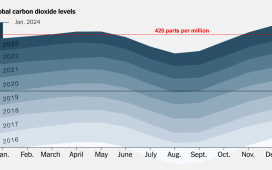The body of a 65-year-old man was also found on a golf course near J. Percy Priest Lake, a reservoir along the eastern edge of the city, according to the police, who said it appeared that he had been swept away by high water after getting out of a car that had run into a culvert.
Search and rescue efforts continued on Sunday, the authorities said, as water levels kept rising. The Cumberland River, which snakes through Nashville, climbed to flood stage on Sunday afternoon and was expected to peak just after midnight Monday morning at nearly 42 feet, which is roughly 10 feet shy of the highest levels reached during the 2010 flood.
The flooding follows days of strong winds and rain that swept through Nashville last week as powerful thunderstorms barraged a swath of the Southeast. The storms pelted Nashville with hail, uprooted trees and knocked out electricity. Yet the city was spared the worst of the devastation, as the storms unleashed tornadoes that shredded through communities in Alabama and Georgia, killing at least six people.
Still, the flooding has presented yet another challenge for Nashville, and what some saw as another test of its resilience.
Beyond the specter of the 2010 floods, Nashville is also still rebuilding from a deadly tornado a year ago that mangled parts of the city that had been the epicenter of its recent boom. It is also clawing its way back from a man-made disaster, as a man bent on destruction detonated an R.V. filled with explosives on Christmas morning, killing himself, leveling or severely damaging a strip of downtown buildings, and disrupting telecommunications across the region for days.
In the news conference on Sunday, Nashville’s mayor, John Cooper, said that city officials would have to examine the influence of climate change and whether major floods had become not “once-in-a-lifetime but once-in-a-decade kinds of events.”
“It’s an unexpected, uneven event,” Mr. Cooper said of the flood, describing fast-changing forecasts and the difficulty in anticipating which creeks would get the most water. Even so, he added, “We will learn from this.”

